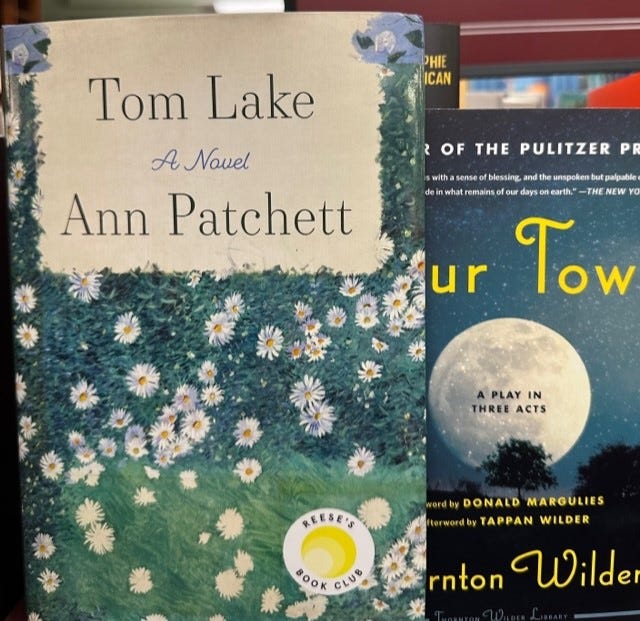Patchett's "Our Town"
A beautiful contemporary novel's ode to a timeless play ...
I am not an Ann Patchett follower. I have read one of her novels, State of Wonder, and have no memories from it. I tried Bel Canto and failed after fifty pages. I have read some of her shorter essays, usually uplifting and insightful. I always thought she wrote well with a terrific ear for dialogue; however, there was a softness that left me doubting the exercise. I wanted her to spend a fortnight with Cormac McCarthy or Hilary Mantel and develop a little “attitude”. This clearly reveals more about me than her since I likely envied her clear eyed, intelligent relationship with joy. It took a drop-dead great review of Tom Lake in The Spectator combined with my complete misread of Diaz’s Trust to send me to her most recent book. I had exhausted my resources at the end of my recent travels and read it on Kindle – a first for me. I loved it … the book that is, not Kindle.
The book revolves around the character of Emily in “Our Town”. If you have read the Oaklawn bestselle
r, Why Teach, you may remember my deeply emotional relationship with this perfect, timeless play. Wilder’s play revolves around Emily’s overwhelming response in the Third Act to returning to her life after dying from childbirth. While revisiting the day of her 12th birthday, she turns to the Stage Manager, wholly broken down …
“I didn’t realize. So all that was going on and we never noticed. Take me back – up the hill – to my grave. But first: Wait! One more look.
Good-by, Good-by, world. Good-by Grover’s Corners … Mama and Papa. Good-by to clocks ticking … and Mama’s sunflowers. And food and coffee. And new-ironed dresses and hot baths … and sleeping and waking up. Oh, earth, you’re too wonderful for anybody to realize you.”
She looks toward the Stage Manager and asks abruptly, through her tears:
“Do any human beings ever realize life while they live it? – every, every minute?”
The Stage Manager replies:
“No … the saints and poets, maybe – they do some.”
Tom Lake is in Wisconsin and is this book’s Grover’s Corner. Like the play, Patchett’s book moves through time. It is in fact an ode to time. Like the play, the mother, reflected amidst her three daughters, is Emily, in the Midwest, on a cherry farm, trying to pick fruit through a pandemic. Like Wilder did with Grover’s Corner in 1938, Patchett creates an intimate world that hurts for all the right reasons. In this special novel, she is one of the “poets” the play’s stage manager suspects may “realize life.”


